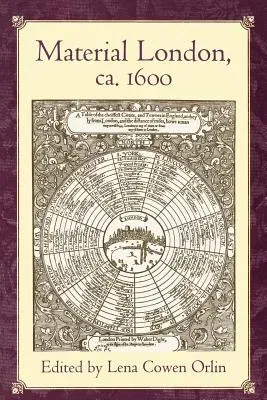Between 1500 and 1700, London grew from a minor national capital to the
largest city in Europe. The defining period of growth was the period
from 1550 to 1650, the midpoint of which coincided with the end of
Elizabeth I's reign and the height of Shakespeare's theatrical career.
In Material London, ca. 1600, Lena Cowen Orlin and a distinguished
group of social, intellectual, urban, architectural, and agrarian
historians, archaeologists, cultural anthropologists, and literary
critics explore the ideas, structures, and practices that distinguished
London before the Great Fire, basing their investigations on the
material traces in artifacts, playtexts, documents, graphic arts, and
archaeological remains.
In order to evoke material London, ca. 1600, each scholar examines a
different aspect of one of the great world cities at a critical moment
in Western history. Several chapters give broad panoramic and
authoritative views: what architectural forms characterized the built
city around 1600; how the public theatre established its claim on the
city; how London's citizens incorporated the new commercialism of their
culture into their moral views. Other essays offer sharply focused
studies: how Irish mantles were adopted as elite fashions in the hybrid
culture of the court; how the city authorities clashed with the church
hierarchy over the building of a small bookshop; how London figured in
Ben Jonson's exploration of the role of the poet.
Although all the authors situate the material world of early modern
London--its objects, products, literatures, built environment, and
economic practices--in its broader political and cultural contexts,
provocative debates and exchanges remain both within and between the
essays as to what constitutes material London, ca. 1600.

